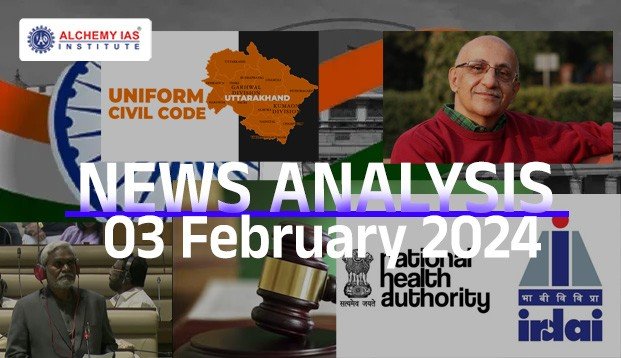3rd February, 2024 (Saturday)
| CONTENT LIST | ||
| Topics | Syllabus | |
| 1 | Vote of Confidence | GS. 2: Indian Polity – Appointment of Chief Minister |
| 2 | Uniform Civil Code | GS. 2: Indian Polity – DPSP |
| 3 | Foreign Contribution Regulation Act | GS: 2: Governance: Development Industry, NGOs |
| 4 | One Nation One Election | GS. 2: Polity & Governance: Simultaneous Election |
| 5 | 22nd Law Commission of India | GS. 2: Polity & Governance: Legislative Reforms |
| 6 | IRDAI | GS. 2: Governance in Health Sector |
| 7 | Navigating Maritime Piracy | GS. 3: Maritime Security: Indian Ocean Region |
VOTE OF CONFIDENCE / TRUST VOTE
GS.2: Indian Polity – Appointment of Chief Minister
Why it’s in the News: After two days of political turmoil, Champai Soren was sworn in as Jharkhand’s Chief Minister. The Jharkhand Mukti Morcha (JMM)-led coalition government plans to seek a vote of confidence on 5th February.
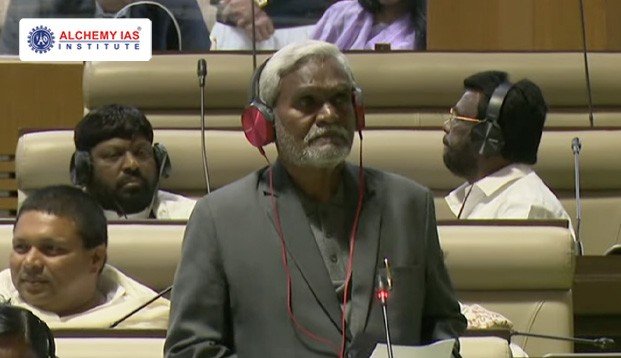
About Vote of Confidence / Trust Vote / Floor Test
- What is a floor test?
- A trust vote, floor test, or no-confidence motion is a constitutional mechanism to determine the legislature’s support for the governing administration.
- The trust vote maintains political accountability of the elected government to the state legislature, applicable in both the parliament and state legislative assemblies.
- While the Constitution doesn’t explicitly mention ‘No confidence motion’ or ‘floor test,’ Articles 75 and 164 emphasize the executive’s collective responsibility to their respective legislatures.
- In the case of states, a trust vote is exclusively conducted in the lower house or legislative assembly, known as the Vidhan Sabha.
- Procedure:
- According to the Constitution, the Governor of the state appoints the Chief Minister.
- When a single party secures a majority of seats, its leader is appointed as the Chief Minister by the Governor.
- If the majority is contested, the claiming party’s leader must move a vote of confidence to prove majority among those present and voting.
- Failure to prove majority results in the Chief Minister’s resignation.
- In cases of coalition government disputes, the Governor can request the Chief Minister to demonstrate majority support in the house.
- The majority is counted based on those present and voting.
- This can also be done through a voice vote where the member can respond orally or through division voting. Some legislators may be absent or choose not to vote.
- In division vote, voting can be done through electronic gadgets, ballots or slips.
- The person who has the majority will form the government.
- In case of tie, the speaker can also cast his vote.
- What is composite floor test?
- There is another test, Composite Floor Test, which is conducted only when more than one person stakes claim to form the government.
- When the majority is not clear, the governor might call for a special session to see who has the majority.
| News Plus Key Supreme Court rulings on trust votes and the Governor’s role:Shivraj Chouhan vs Speaker (2018):Governor can call for a trust vote if they believe the government lacks legislative confidence, without favoring any party.Trust vote can proceed even if cases against rebel MLAs are pending.Governor’s decision to call for a trust vote can be reviewed judicially.SR Bommai Case (1994):Chief Minister’s refusal to undergo a floor test indicates loss of legislative confidence.Nabam Rebia case (2016):Governor’s actions like summoning or dissolving the House require advice from the council of ministers.Governor can order a floor test if they believe the Chief Minister and council of ministers lack legislative support.Pratap Gowda Patil vs State of Karnataka (2019):Rebel MLAs have the right to abstain from the floor test.Governor can dissolve the Assembly if the government lacks legislative support. |
UNIFORM CIVIL CODE
GS.2: Indian Polity – Directive Principle of State Policy (DPSP)
Why it’s in the News: Recently, the five-member committee in Uttarakhand submitted the final report on the Uniform Civil Code (UCC) to Chief Minister Pushkar Singh Dhami.
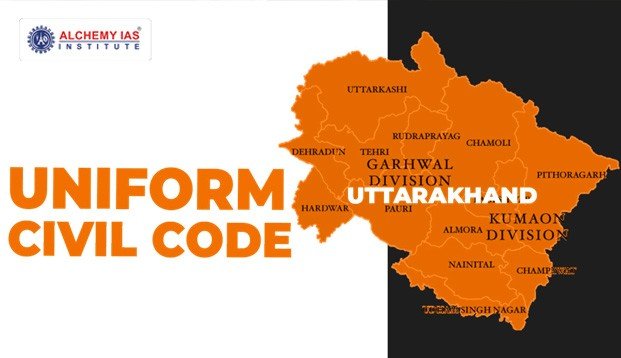
What is Uniform Civil Code (UCC)
- The Uniform Civil Code (UCC) is a proposal in India aiming to replace diverse personal laws based on religion, customs, and traditions with a singular law applicable to all citizens, irrespective of religious, caste, creed, sexual orientation, or gender differences.
- Constitutional Context:
- Envisioned by the framers of the Constitution, UCC is a directive principle of state policy, outlined in Article 44 of the Directive Principles, emphasizing the aspiration for a uniform legal framework regarding marriage, divorce, inheritance, and adoption.
- Challenges and Controversies:
- The proposal faces resistance from various religious communities, including orthodox Hindus, Muslims, Sikhs, and others, leading to its inclusion in the Directive Principles rather than Fundamental Rights.
- Legal Perspectives:
- Despite constitutional directives, the implementation of UCC encounters challenges concerning fundamental rights, notably Article 25 and Article 29, along with provisions for states like Nagaland and Mizoram.
Judicial and Governmental Positions:
- Supreme Court Advocacy:
- The Supreme Court, through judgments like Mohd. Ahmed Khan vs Shah Bano Begum (1985) and subsequent cases, has consistently urged the government to implement UCC.
- Law Commission’s Stand:
- The Law Commission, in a 2018 consultation paper, deemed UCC unnecessary at present, suggesting a focus on amending discriminatory practices within personal laws.
Current State Implementations:
- Goa’s Precedent:
- Goa’s Civil Code, in force since Portuguese colonial times, serves as a model for UCC, albeit with complexities.
- State-Level Initiatives:
- Recent developments include Uttarakhand’s decision to implement UCC, with the formation of a committee tasked with drafting proposals, along with support from states like Assam and Gujarat.
By consolidating these sections and refining the narrative, the complexities and significance of UCC within India’s legal and social landscape are elucidated concisely.
FOREIGN CONTRIBUTION (REGULATION) ACT (FCRA)
Syllabus: GS: 2: Governance: Development Industry, NGOs
Why it’s in the News: The CBI searched two premises linked to former IAS officer and activist Harsh Mander for alleged FCRA violation involving the NGO, Centre for Equity Studies.
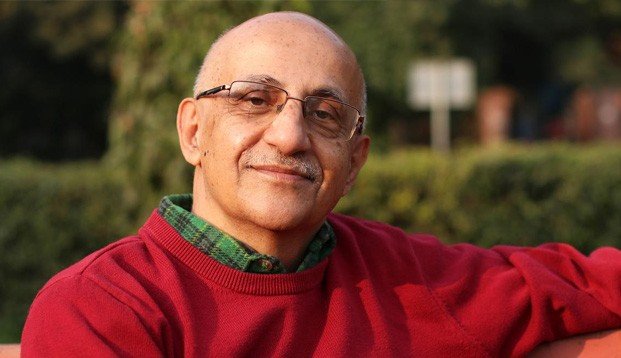
Harsh Mander | Photo Credit: The Hindu
Understanding the Foreign Contribution Regulation Act (FCRA)
- History and Purpose
- Enacted in 1976 during the Emergency to address concerns of foreign interference.
- Aimed to regulate foreign donations to ensure alignment with national interests.
- Amendments and Government Control
- 2010 amendment consolidated and prohibited use for activities against national interest.
- 2020 amendment increased government control over foreign funds for NGOs.
- Key Provisions
- The FCRA mandates that individuals or NGOs receiving foreign donations must register under the Act, open a designated bank account in the State Bank of India, Delhi, and utilize the funds only for specified purposes outlined in the Act.
- Annual returns must be filed, and funds cannot be transferred to other NGOs.
- Additionally, certain entities such as election candidates, journalists, media companies, judges, government servants, legislators, political parties, and politically affiliated organizations are prohibited from receiving foreign funds, except under specific circumstances with proper declarations.
- Recent Changes and Exemptions
- 2020 amendments increased compoundable offenses and raised exemption limit for contributions.
- Certain entities exempted from prosecution for foreign contributions from relatives abroad.
- FCRA Registration Process
- NGOs apply online with required documentation, subject to scrutiny by the Ministry of Home Affairs (MHA).
- MHA assesses applicant’s background, ensuring compliance with FCRA criteria.
- Duration and Renewal
- FCRA registration valid for five years, with renewal required within six months of expiry.
- Failure to renew leads to expiration, necessitating permission for fund utilization.
- Cancellation Criteria
- FCRA registration can be cancelled for false statements, violations, inactivity, or defunct status.
- Central Government may cancel registration in the public interest.
- Enforcement and Accountability
- NGOs have right to appeal cancellation in High Court.
- Noteworthy NGOs, like Greenpeace India and Amnesty International, have faced scrutiny and cancellation.
- FCRA’s Controversial Usage
- Allegations of targeted crackdown on NGOs under both UPA and NDA governments.
- Sharp decline in registered NGOs since 2011, with significant cancellations in recent years.
Conclusion
- FCRA serves to regulate foreign contributions, but its implementation has sparked debate over governmental targeting of NGOs, raising questions about its impartiality and impact on civil society.
ONE NATION, ONE ELECTION
Syllabus: GS. 2: Polity & Governance: Simultaneous Election
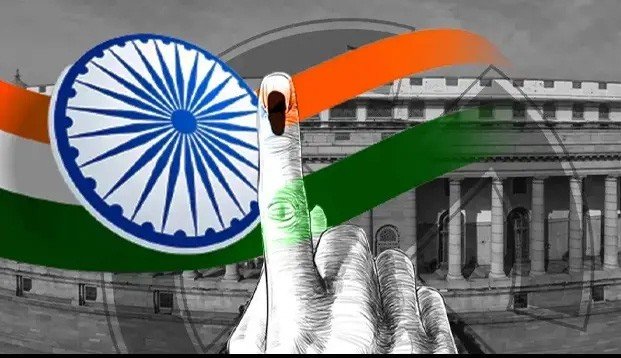
Why it’s in the News: Recently, Union Law Minister Arjun Meghwal told the Lok Sabha that no set time limit has been given for the high-level committee on simultaneous polls, chaired by former President Ram Nath Kovind.
Exploring One Nation, One Election: Streamlining India’s Electoral Process
- The government, led by Prime Minister Narendra Modi, has formed a committee chaired by former President Ram Nath Kovind to delve into the concept of ‘One Nation, One Election’, aiming to synchronize the Lok Sabha and state assembly elections.
- This initiative underscores the government’s commitment to overhaul the electoral system, as announced on September 1st, coinciding with Parliamentary Affairs Minister Pralhad Joshi’s declaration of a special parliamentary session scheduled for September 18-22, 2023.
Understanding ‘One Nation, One Election’:
- ‘One Nation, One Election’ proposes aligning the schedules of Lok Sabha and state assembly elections, potentially consolidating them into a single event.
- Prime Minister Modi has been a vocal advocate for this reform, emphasizing its efficiency and streamlining benefits, especially as India faces a series of impending elections, with assembly polls in five states followed closely by the Lok Sabha elections, projected for May-June 2024.
Pros of ‘One Nation, One Election’:
- Cost Reduction:
- Consolidating elections minimizes financial burdens associated with conducting separate polls.
- Administrative Efficiency:
- Simultaneous elections alleviate strain on administrative and security forces, optimizing resource utilization.
- Enhanced Governance Focus:
- Streamlined electoral cycles allow governments to prioritize governance over recurring election preparations, facilitating policy implementation.
- Increased Voter Turnout:
- According to the Law Commission, synchronized elections may boost voter participation by offering convenience and simplicity, potentially raising overall turnout rates.
Cons of ‘One Nation, One Election’:
- Constitutional Amendments:
- Implementation of ‘One Nation, One Election’ necessitates constitutional and legal revisions, involving complex procedures and approvals from state assemblies.
- Potential Dilution of Regional Issues:
- Concerns arise regarding the overshadowing of local and regional concerns by national agendas, potentially skewing electoral outcomes at the state level.
- Political Consensus Challenges:
- Achieving consensus among diverse political parties remains a formidable obstacle, with several opposition parties voicing reservations and opposition towards the initiative.
This succinct overview delineates the key aspects, advantages, and challenges associated with the ‘One Nation, One Election’ proposal, underscoring its potential to reshape India’s electoral landscape while highlighting the complexities inherent in its implementation.
LAW COMMISSION OF INDIA
Syllabus: GS. 3: Defence Sector – Important Bodies in News
Why it’s in the News: The 22nd Law Commission of India has recommended the retention of criminal defamation within India’s criminal laws, according to the Law Ministry. This recommendation came as the panel submitted its report to the Ministry recently.
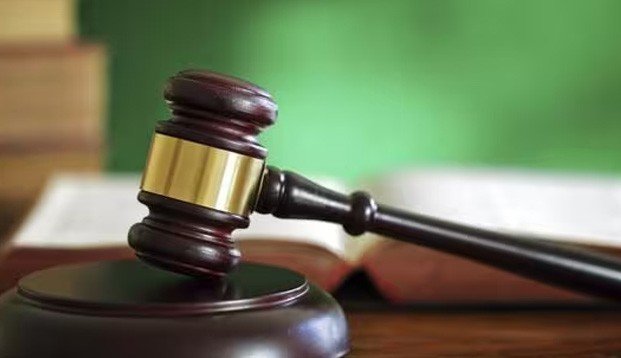
About Law Commission of India
- The Law Commission of India, a non-statutory body, is constituted by a notification of the Government of India with specific terms of reference for legal research and recommendations.
- Established in 1955, the Commission has submitted 277 reports to date.
- Chaired by Justice Awasthi, the 22nd Law Commission succeeded the tenure of the 21st Commission led by former Supreme Court Justice B S Chauhan, which concluded on August 31, 2018.
- Approved by the Union Cabinet in February 2020, it was finally constituted two and a half years later.
- Mandated to identify obsolete laws, examine existing laws in line with Directive Principles of State Policy, and suggest reforms.
Recommendations on Criminal Defamation
- The 22nd Law Commission of India suggested keeping criminal defamation in place in the country’s legal system.
- It stressed the importance of safeguarding the right to reputation, as per Article 21 of the Constitution, which guarantees the right to life and personal liberty. Reputation, being a valuable but fragile asset, requires protection, according to the Commission.
- While recognizing the tension between criminal defamation and freedom of speech, the Commission advised exercising caution. The Commission proposed that speech should only be considered illegal if it causes significant harm that materializes.
- Regarding punishment, the Commission mentioned the option of community service as an alternative under Bharatiya Nyaya Sanhita. This addition aims for a balanced approach, protecting victims’ interests while minimizing potential misuse.
- Overall, the Commission’s recommendations highlight the need to strike a balance between protecting the right to reputation and ensuring freedom of speech and expression, while also addressing concerns regarding punishment and potential misuse of defamation laws.
| News Plus: Right to reputation and free speech The right to reputation, integral to human dignity per Article 21 of the Indian Constitution, is also recognized in international conventions like the Universal Declaration on Human Rights and the International Covenant on Civil and Political Rights.Article 21 ensures the right to dignity, safeguarding reputation and prestige. Meanwhile, Article 19 grants freedom of speech, albeit subject to “reasonable restrictions” outlined in Article 19(2), including defamation laws.Defamation, as per section 499 of the IPC, encompasses any statement, whether spoken, written, or visual, damaging a person’s reputation. Conflict arises when free speech infringes upon reputation, necessitating a balance under Articles 19(1)(a) and 21 by the Supreme Court.While citizens have the right to express their views, they must do so responsibly, considering the laws in place to protect dignity and maintain public order. It’s not just the government’s duty to regulate speech; individuals must also refrain from abusing their freedom of speech. |
IRDAI
Syllabus: GS. 2: Governance in Health Sector
Why it’s in the News: Insurance regulator IRDAI has set April 1 as deadline for insurers to include AYUSH treatment under health covers.
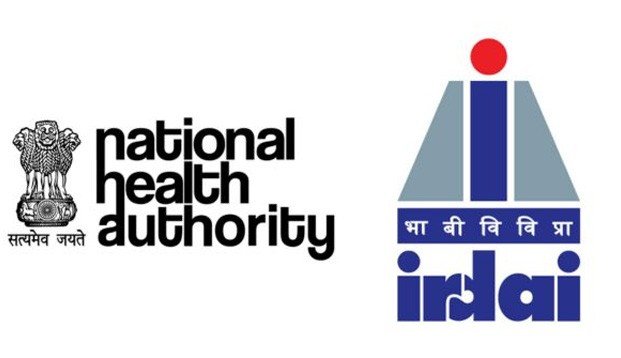
Introduction to Insurance
- Insurance, tracing back 6,000 years, has been a cornerstone for individuals seeking financial security.
- Defined as a system providing compensation for specified loss, damage, illness, or death in exchange for premiums, insurance has evolved to encompass various forms of protection.
Formation of IRDAI
- In India, insurance initially operated under government regulation. However, the need for a dedicated regulatory body led to the establishment of the Insurance Regulatory and Development Authority of India (IRDAI).
- This independent entity oversees and regulates both life and general insurance companies, ensuring the sector’s integrity and growth.
Role and Functions of IRDAI
- The primary objective of IRDAI is to uphold the provisions outlined in the Insurance Act, focusing on protecting policyholders by ensuring fair treatment and safeguarding their interests, regulating the industry to maintain financial stability and clarity in regulations to foster growth, and framing regulations by periodically updating rules to eliminate ambiguity and promote industry transparency.
Significance in India’s Insurance Landscape
- IRDAI plays a pivotal role in shaping India’s insurance landscape, emphasizing:
- Policyholder Protection: Safeguarding interests and ensuring fair dealings.
- Industry Growth: Facilitating organized expansion to benefit the populace.
- Fair Conduct: Promoting integrity, transparency, and financial soundness within insurance companies.
- Efficient Claims Settlement: Ensuring prompt resolution of legitimate claims and addressing grievances effectively.
- Preventing Malpractices: Mitigating fraud and maintaining market integrity.
- Regulatory Oversight: Supervising insurance companies’ conduct and promoting financial stability.
- Types of Insurance Policies Regulated by IRDAI
- IRDAI regulates two main categories: life insurance and general insurance. Life insurance focuses on policies safeguarding individuals’ lives, while general insurance covers diverse areas such as health, vehicle, property, commercial, and travel insurance.
Conclusion
- IRDAI stands as a cornerstone in India’s insurance sector, ensuring robust regulation, policyholder protection, and industry growth. Through its vigilant oversight and regulatory measures, it fosters a trustworthy and sustainable insurance environment, benefiting both insurers and policyholders alike.
NAVIGATING MARITIME PIRACY: A GLOBAL CHALLENGE
Syllabus: GS. 3: Maritime Security: Indian Ocean Region
Why it’s in the News: Piracy is as old as seafaring itself, and has existed for centuries in various forms. In recent years, waters off the west coast of Africa, Gulf of Aden, Horn of Africa, Bangladesh, and the Strait of Malacca have seen attacks by pirates.
Understanding Maritime Piracy
Piracy, an age-old issue, persists in modern times, particularly in regions like the Gulf of Aden, Horn of Africa, and the Strait of Malacca. These criminal acts, encompassing robbery, hijacking, and kidnapping, threaten seafarers and disrupt global trade.
- International Legal Framework
- Article 101 of the UNCLOS defines piracy, enabling legal action against perpetrators on the high seas.
- It addresses acts of violence, detention, or destruction committed for private gain, emphasizing the need for international cooperation in combating piracy.
- Impact of Maritime Piracy:
- Economically, piracy disrupts trade routes, leading to increased costs and delays.
- Humanly, it endangers seafarers’ lives and inflicts psychological trauma.
- Moreover, piracy exacerbates regional instability, hindering socio-economic development in affected areas.
- India’s Encounter with Piracy:
- India’s extensive coastline and maritime trade make it susceptible to piracy, especially in the Gulf of Aden.
- Piracy threatens trade routes vital to India’s economy, prompting naval responses like Operation Atalanta to ensure maritime security.
- Legislative Response: Anti-Piracy Bill
- India’s Anti-Maritime Piracy Bill, 2022, empowers authorities to combat piracy beyond its Exclusive Economic Zone. It aligns with UNCLOS provisions, defining piracy and enabling legal action against offenders.
- Global Initiatives to Combat Piracy:
- International efforts, such as UNCLOS, CMF, and Operation Atalanta, bolster maritime security and deter piracy. Industry best practices, regional cooperation, and public-private partnerships further enhance anti-piracy measures globally.
Conclusion:
Maritime piracy persists as a complex challenge, necessitating global collaboration. By addressing root causes, enhancing security, and fostering cooperation, the international community aims to create safer seas for all nations. Through unified action, we endeavor to safeguard seafarers, secure trade routes, and fortify the maritime ecosystem against piracy’s threats.

